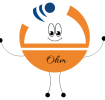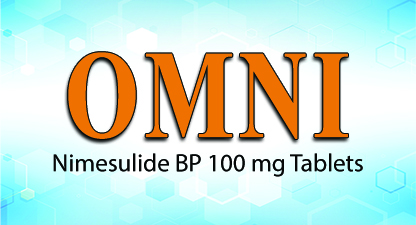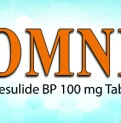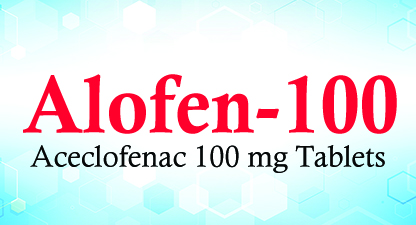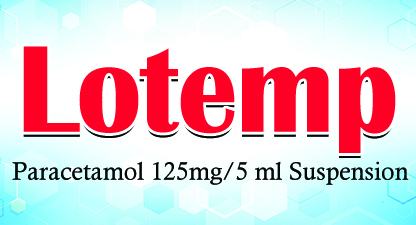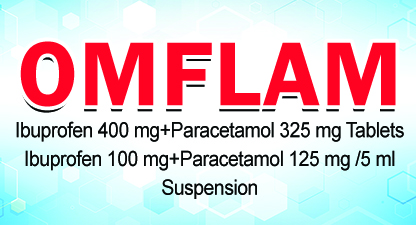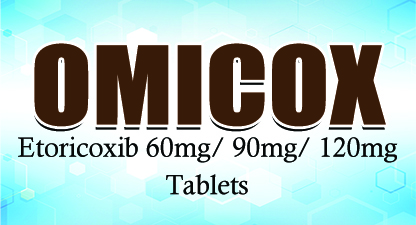OMNI
Nimesulide is a relatively COX-2 selective, non-steroidal anti-inflammatory drug (NSAID) with analgesic and antipyretic properties. Its approved indications are the treatment of acute pain, the symptomatic treatment of osteoarthritis and primary dysmenorrhea in adolescents and adults above 12 years old. It has a multifactorial mode of action and is characterized by a fast onset of action.
- Categories : NSAIDs
- Share Now :
In severe pain and inflammatory condition..
OMNI
Generic Name: Nimesulide
Therapeutic Category: Non-steroidal Anti-inflammatory Drug (NSAID)
Pharmacological Class: Selective Cyclooxygenase inhibitor
Composition: Each uncoated tablet contains Nimesulide BP 100 mg
Pregnancy Category: C (up to second trimester); D (in third trimester)
Presentation: Available in the pack size as 10 tablets X 30 blisters
Mechanism of Action
The mechanism of action of Nimesulide is not completely understood. The therapeutic effects of Nimesulide are postulated to be the result of targeting a number of key mediators of the inflammatory process such as: COX-2 mediated prostaglandins.
Indications
- Fever
- Osteoarthritis
- Rheumatoid arthritis
- Ankylosing spondylitis*
- Gouty Arthritis
- Headache
- Dental Pain
- Post-Operative Pain
- Pain During Menstruation
- Arthralgia*
- Myalgia*
Dosage
Route of administration: Oral
Adults (18 years or older): The usual dose is 100 mg per day.
Children above 12 years old: 5 mg/kg/day in 2-3 divided doses
Pharmacokinetics
Absorption: Rapidly absorbed following oral administration.
Protein binding: Approximately greater than 97.5%
Metabolism: Hepatic
Route of elimination: Renal (50%), Fecal (29%)
Half-life: 1.8 - 4.7 hours
Adverse Effects
- Common side-effects are: Abdominal pain, nausea and vomiting, skin rash, constipation, diarrhea, indigestion, tinnitus, bitterness in mouth,
- Hypersensitivity reactions like bronchospasm, rashes.
- May lead to gastrointestinal bleeding in prolonged use.
Contraindications
OMNI is contraindicated in the following populations and situations:
- Hypersensitivity to Nimesulide or any other components of the formulation.
- Asthma
- Urtiaria*
- Liver problems
- Children under 12 years of age
Precautions
- In kidney and renal disease.
Drug Interactions
- ACE inhibitors: May diminish the anti-hypertensive effect.
- Diuretics: May reduce the therapeutic effect of Diuretics.
- Lithium: When administered with Omni, may cause lithium toxicity.
- Warfarin: Effects of Omni and warfarin in GI bleeding is synergistic i.e. Increase the bleeding.
Advantages
- OMNI has superior gastrointestinal safety than other NSAIDs.
- It has proven benefits in the treatment of acute (short term) pain, osteoarthritis, pain during period.
*Terminologies:
Ankylosing Spondylitis: A type of arthritis that affects the spine.
Arthralgia: Pain in a joint.
Myalgia: Pain in a muscle or group of muscles
Urticaria: A kind of skin rash with red, raised, itchy bumps. They may also burn or sting.
Indications
- Fever
- Osteoarthritis
- Rheumatoid arthritis
- Ankylosing spondylitis*
- Gouty Arthritis
- Headache
- Dental Pain
- Post-Operative Pain
- Pain During Menstruation
- Arthralgia*
- Myalgia*
Contraindications
OMNI is contraindicated in the following populations and situations:
- Hypersensitivity to Nimesulide or any other components of the formulation.
- Asthma
- Urtiaria*
- Liver problems
- Children under 12 years of age
Dosage
Route of administration: Oral
Adults (18 years or older): The usual dose is 100 mg per day.
Children above 12 years old: 5 mg/kg/day in 2-3 divided doses
